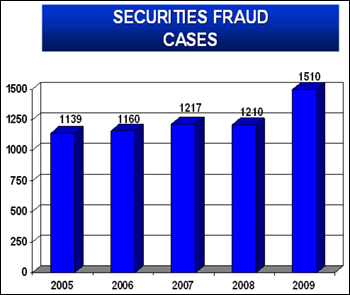|
High Yield Investment Frauds
- Characterized by promises of high rates of return with little or no risk.
- May involve various forms of investments (e.g. securities, commodities, real estate, precious metals, etc.)
- "Too good to be true” investment opportunities.
- Perpetrators may contact victims by telephone, e-mail, or in person.
- The offers are generally unsolicited.
Ponzi & Pyramid Schemes
- Use money collected from new victims to pay the high rates of return promised to earlier investors.
- Payouts give the impression of a legitimate, money-making enterprise behind the fraudster's story.
- In reality, investors are the only source of funding.
Advance Fee Schemes
- Victims advance relatively small sums of money in the hope of realizing much larger gains.
- Gains never materialize because there is no legitimate underlying investment.
- To participate a particular investment opportunity, victims must first send funds to cover “taxes” or “processing fees.”
- After victims send the “fees,” the perpetrators appropriate the funds and never deliver on the investment.
Protect Yourself—How You Can Avoid Becoming a Victim
Identify the warning signs
- Does the offer sound too good to be true?
- Is the seller using high pressure sales tactics?
- Was the investment offer unsolicited?
- Did the seller ask for information that is usually considered personal (e.g. social security number, credit card information, etc.) over the phone or Internet?
- If you answer “yes” to any of the above questions when considering an investment opportunity, you may be the target of a scam artist.
Take action to avoid fraud
- Don’t believe everything you are told by the seller. Take the time to do your own research on the investment’s potential.
- Don’t assume the solicitor is who he or she claims to be.
- Check with federal and state securities regulators to find out if there have been any complaints against the company.
- Ask the promoter whether—and how much—he or she has been paid to tout the opportunity.
- Ask where the company is incorporated and then call that state to ensure that the company has a current annual report on file.
- Request written financial information, such as a prospectus, annual report, offering circular, or financial statements, then compare the written information to what you were told.
- Get offers in writing and save a copy for your records.
- Check with a trusted financial advisor, your broker, or an attorney about any investments you are considering.
Report scams when they occur
- Don’t be embarrassed.
- File a complaint with the Securities and Exchange Commission, state securities regulator, or a law enforcement agency.
- Report the crime promptly—you’ll have a better chance of getting your money back if you do.
|
|







